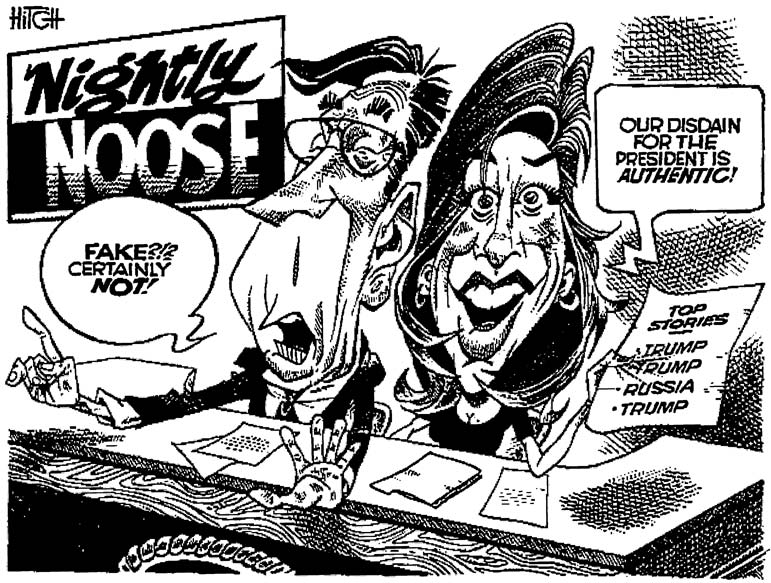
There's a new appreciation for shoe-leather reporting. "Clicks and subscriptions are up, welcome news for an industry in shaky financial shape."
Some of that is sort of true, and The New York Times is entitled to its opinion, which it attempts to link to great hits of others in the past, particularly by invoking the names of Bob Woodward and Carl Bernstein, two reporters for The Washington Post who are celebrated by journalists everywhere for bringing down Richard Nixon in "the Watergate scandal."
But this is not exactly the time for celebrating the press --- or the "media," the fancy name for a cheapened product. Collective guilt decrees that journalists everywhere take a hit for one of the most spectacular press/media scandals of our time.
Just when everyone assumed the press had gone as far as it could go in promoting the high-tech lynching of Donald Trump, a "news" site called BuzzFeed managed to go an inch or two lower.
BuzzFeed figured it had dropped the Big One that would finally, absolutely, positively, once and for all destroy the president and assure a place with Woodward and Bernstein in Valhalla for Jason Leopold, whom it described as "one of the best journalists" in the world.
BuzzFeed reported that Michael Cohen, the president's onetime lawyer, said he had been instructed by the president to lie to Congress about a Trump project in Moscow. "If true," the new standard by which press pack measures its work, the Donald was well and truly cooked.
Robert Mueller, the special counsel, had the goods, BuzzFeed assured everyone, so somebody get a rope. The press pack celebrated by losing its collective mind over the disclosures, such as they were. Twitterdom exploded in a blast of spontaneous combustion. "This is stunning, " said Don Lemon of CNN. Lawrence O'Donnell of MSNBC called it "a Nixonian moment."
David Brooks, a columnist for The New York Times and part-time wise man for NPR, said it was OK to celebrate because BuzzFeed was OK. It was New Years Eve in Times Square.
That's when Robert Mueller turned grinch and blew out the lights. The special counsel put out a brisk and unequivocal statement that none of it was true. "BuzzFeed's description of specific statements to the special counsel's office and characterization of document and testimony obtained by this office, regarding Michael Cohen's congressional testimony are not accurate," the statement said.
The party was over but nobody would go home. Some of the guests went to work, grunting and wheezing like a constipated elephant, to say that the Mueller statement, broad and specific, wasn't actually a rebuttal of the Buzzfeed scoop.
Chris Matthews of MSNBC said the scoop was inaccurate but not wrong. How could it be when so many good people were so sincere in wanting it to be right?
No one had wanted to look too closely at the work of the man who produced the Big One. Jason Leopold, who wrote the account together with Anthony Cormier, had worked at BuzzFeed since 2017 and before that at the Los Angeles Times, at Dow Jones & Co., publishers of The Wall Street Journal, and as a free-lancer with credits in several publications.
"I love the score," he told The New York Times for a profile four years ago. "So maybe there's this druggish thing in me that still exists, maybe that was always part of my personality. I love the score. I love the score!"
Mr. Leopold has been accused of plagiarism, a sin regarded as fairly serious in many newsrooms, and in a book he wrote that he had engaged in "lying, cheating and back-stabbing," and had struggled with substance abuse and mental illness.
"I have a checkered past," he wrote, "and I was hoping that by coming clean about my own past, it would allow me to move forward."
Only a hard man would not feel some sympathy for someone trying to make good on a second (or third) chance, but he miscalculated in thinking that the president had become so hated that if there was no evidence available you could just make it up.
Bob Woodward has relevant word for him. "I say to you on the record," the Watergate man said the other day, "I am thankful I don't have to cover this story on a daily basis. The hydraulic pressure in the system is just too great. The impatience of the Internet -- to give it to us immediately -- drives so much, it's hard to sort something like this out."
That's the dreary lesson for this bad, very bad, time for the press. This is a tragic, sordid age for journalism.
Every weekday JewishWorldReview.com publishes what many in the media and Washington consider "must-reading". Sign up for the daily JWR update. It's free. Just click here.
(COMMENT, BELOW)
JWR contributor Wesley Pruden is editor emeritus of The Washington Times. His column has appeared in JWR since March, 2000.


 Contact The Editor
Contact The Editor
 Articles By This Author
Articles By This Author